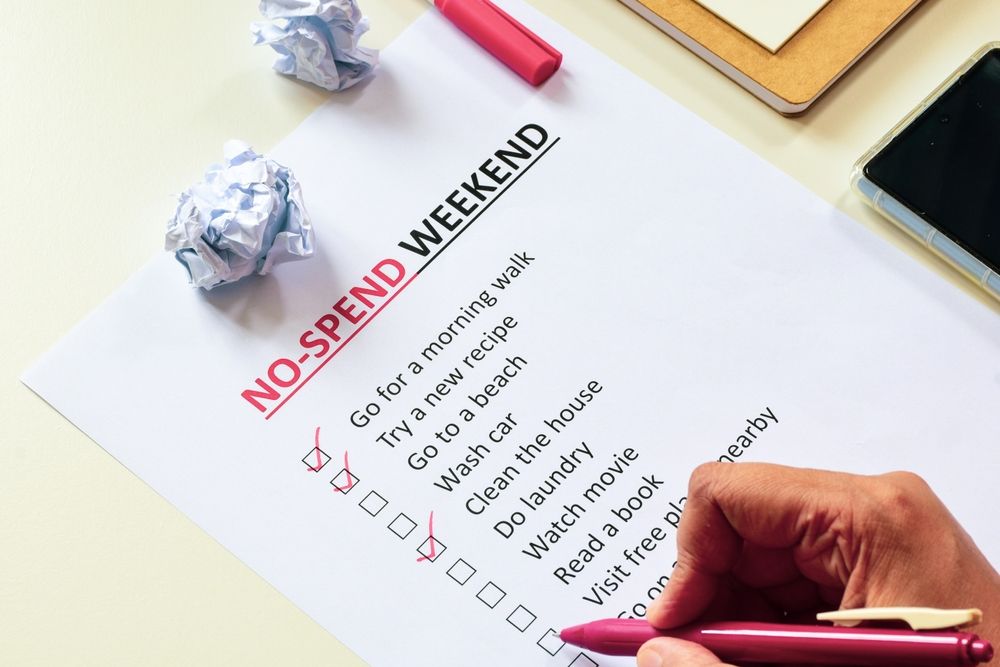If your weekends often leave your wallet emptier than you expected, you’re not alone. From brunches and impulse shopping to entertainment and gas, weekends can quietly drain your budget. One surprisingly effective way to take control of your spending is by introducing a “no-spend weekend.”
A no-spend weekend is exactly what it sounds like—a short period where you intentionally avoid any non-essential spending. The goal isn’t to deprive yourself, but to reset your habits, get creative, and reframe your relationship with money. With just two days of awareness and intention, you can save cash and learn a lot about what truly brings you joy.
Why Try a No-Spend Weekend?
Cutting back for just a couple of days might not seem like it would make a big difference, but it can have ripple effects.
Here’s what a no-spend weekend can help you accomplish:
-
Instant savings: You avoid common weekend costs like dining out, entertainment, and shopping.
-
Better financial awareness: You become more conscious of what you usually spend money on.
-
Less impulse buying: Taking a break helps you rethink what’s truly necessary.
-
Creative alternatives: You’ll discover low-cost or free activities that you might overlook otherwise.
-
Stress relief: Fewer errands and outings can mean a calmer, slower-paced weekend.
Most importantly, it’s a small, manageable step toward bigger savings goals.
Plan Ahead to Avoid Temptation
The key to a successful no-spend weekend is preparation. Without a plan, boredom can quickly lead to spending “just this once.”
Tips to prepare:
-
Clean out your fridge and pantry in advance to ensure you have food at home.
-
Fill up your gas tank beforehand if driving is necessary.
-
Take care of errands like grocery shopping during the week.
-
Let friends and family know you’re doing a no-spend weekend so they don’t tempt you with last-minute plans.
-
Create a list of free or at-home activities to make the weekend feel full, not restricted.
With a little prep, the experience feels less like cutting back and more like a refreshing reset.
Focus on What You Can Do—Not What You Can’t
A no-spend weekend isn’t about sitting at home doing nothing. It’s about rediscovering fun, meaningful activities that don’t require your debit card.
Try these no-spend ideas:
-
Declutter your home—organizing can be surprisingly satisfying and productive.
-
Cook meals from what you already have—make it a challenge to use up pantry items.
-
Go on a hike or walk—spend time outdoors and enjoy nature.
-
Host a game or movie night at home using what you already have.
-
Tackle a DIY project you’ve been putting off.
-
Read a book, start a journal, or explore a new hobby that requires no new materials.
The key is to shift your mindset from “I can’t spend” to “what can I enjoy for free?”
Use It as a Time to Reflect on Spending Habits
During your no-spend weekend, pay attention to moments when you feel the urge to spend.
Ask yourself:
-
What triggered the impulse?
-
Was it boredom, stress, or habit?
-
Did you actually need that item or experience?
This self-awareness helps you make more mindful decisions in the future. Over time, you may find that many of your spending habits were based on emotion or convenience—not necessity.
Set a Small Reward (That Doesn’t Cost Money)
Although the reward is financial savings, it can help to set another positive outcome as motivation.
For example:
-
After the weekend, allow yourself a relaxing bath or extra time doing something you love.
-
Create a visual tracker of your no-spend weekends and celebrate milestones (like completing 5 in a row).
-
Transfer what you would’ve spent into a savings account to see your progress grow.
The sense of accomplishment will keep you motivated to make it a recurring habit.
Involve Others to Make It More Fun
Doing a no-spend weekend with your partner, roommate, or family adds a layer of accountability—and fun.
Ideas for shared no-spend activities:
-
Cook a special meal together from pantry ingredients.
-
Have a board game tournament or host a puzzle night.
-
Do a home workout challenge as a group.
-
Work together on a DIY or home improvement task.
Making it social turns it from a personal finance challenge into a bonding experience.
Make It a Monthly Habit
The first no-spend weekend might take a little extra planning, but the benefits will inspire you to do it again. Aim to schedule one every month, or even every other week.
Consistent no-spend weekends can lead to:
-
Hundreds of dollars saved over the year
-
Reduced financial stress
-
Better habits that carry over into the workweek
-
Increased appreciation for free or low-cost pleasures
Track how much you’re saving, and watch your financial cushion grow.
What to Avoid During No-Spend Weekends
To keep your no-spend weekends effective, watch out for common pitfalls:
-
“I’ll just buy one thing” mindset – This often spirals into more. Stay firm.
-
Browsing online stores for fun – Even if you don’t buy, it’s tempting and defeats the purpose.
-
Replacing spending with screen time – Try to unplug and focus on real-life moments.
-
Comparing your weekend to others’ social media – Focus on your own progress and goals.
Being clear about your boundaries ahead of time helps you stick to the plan without guilt or temptation.
What to Do with the Money You Save
The money you save from a single no-spend weekend might not seem life-changing on its own, but when you’re intentional with it, it adds up fast.
Smart ways to use your savings:
-
Add it to an emergency fund.
-
Pay off a credit card balance.
-
Build a vacation or holiday fund.
-
Put it toward a sinking fund for home repairs or car maintenance.
-
Save for a bigger goal like a new gadget or experience—without going into debt.
Assigning purpose to the money helps keep you focused and makes the effort feel worthwhile.
No-spend weekends are a simple yet powerful way to cut back on unnecessary expenses, reset your mindset, and reconnect with the things that truly matter. With a little planning, a willingness to get creative, and the motivation to build healthier money habits, these two-day challenges can be a game-changer for your budget.
The best part? You don’t have to give up fun, comfort, or connection—you just find smarter ways to enjoy them. After a few successful weekends, you might even look forward to the break from spending and the peace it brings.



